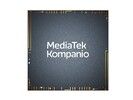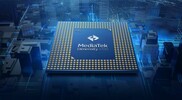UNISOC Tangula T760 vs MediaTek Kompanio 1300T vs MediaTek Dimensity 1300
UNISOC Tangula T760
► remove from comparison
Der UniSoc T760 Tanggula ist ein Mittelklasse-SoC mit 8 Prozessorkernen in zwei Clustern. Die vier großen ARM Cortex-A76-Kerne werden so wie die kleinen vier ARM Cortex-A55-Kerne mit 2 GHz getaktet. Der schnellere UniSoc T770 bietet im Vergleich deutlich schneller getaktete A76 Cores.
Der integrierte Speicherkontroller unterstützt LPDDR4/4X mit bis zu 2133 MHz (2x 16 Bit). Der integrierte ISP unterstützt zwei Hauptkameras und 2 Nebenkameras (eine bis zu 108 MPixel). Als integrierte Grafikkarte kommt eine ARM Mali-G57 MC4 (4 Kerne) zum Einsatz. Weiters unterstützt der T760 auch AI Beschleunigung mit bis zu 4,8 TOPS Spitzenleistung.
Der Chip wird im aktuellen 6nm Prozess gefertigt und sollte eine gute Stromeffizienz aufweisen.
MediaTek Kompanio 1300T
► remove from comparison
Der im Juli 2021 vorgestellte MediaTek Kompanio 1300T ist ein Achtkern-SoC, das speziell für Tablets entwickelt wurde und sich performancemäßig im Oberklasse-Bereich ansiedelt.
Der MediaTek Kompanio 1300T SoC setzt auf vier schnelle ARM Cortex-A78-Kerne, die mit bis zu 2,6 GHz takten, sowie vier stromsparende Cortex-A55-Kerne mit jeweils 2,0 GHz. Für die Grafikberechnungen kommt die 9-Core-GPU Mali-G77 MC9 zum Einsatz. Der Kompanio 1300T kann bis zu 16 GB LPDDR4x-RAM adressieren, das mit maximal 2133 MHz getaktet sein kann, und unterstützt Dual-Channel UFS-3.1-Systemspeicher. Im Vergleich zum ähnlichen Dimensity 1200/1300, gibt es beim Kompanio keinen schneller getakteten Prime Core und damit eine etwas geringe Single-Thread-Leistung.
Außerdem integriert das 64-Bit-SoC ein schnelles 5G-Modem mit Dual-5G-SIM-Support, Wi-Fi 6 (WLAN 802.11a/b/g/n/ac/ax), Bluetooth 5.2, einen KI-unterstützten Bildprozessor für eine 108-MP-Kamera sowie Unterstützung für bis zu 2560 x 1440 Pixel auflösende Displays mit HDR10+, die mit einer Bildwiederholrate von bis zu 120 Hz angesteuert werden können. In niedrigeren Auflösungen sind maximal 144 Hz möglich. Die Video-Engine unterstützt 4K60-Enkodierung (H.264, H.265 / HEVC) sowie 4K60-Dekodierung (H.264, H.265 / HEVC, VP-9, AV1).
MediaTek Dimensity 1300
► remove from comparison
Der Dimensity 1300 ist ein Oberklasse-Prozessor für Smartphones mit integriertem 5G Modem. Der CPU-Teil besteht aus drei Clustern: Einem schnellen Performance-Kern, basierend auf der ARM-Cortex-A78-Architektur und getaktet mit bis zu 3 GHz. Der zweite Cluster besteht aus drei Cortex-A78-Kernen mit bis zu 2,6 GHz. Als Stromspar-Cluster sind vier ARM Cortex-A55 Kerne mit bis zu 2 GHz verbaut.
Diese Architektur entspricht exakt der des MediaTek Dimensity 1200. Auch ansonsten gibt es keine Unterschiede in der Ausstattung zwischen beiden Chips.
So unterstützt der Dimensity 1300 Dual-SIM-5G (5G SA & NSA, max 4.7 Gbps Download und 2.5 Gbps Upload). Zudem integriert das SoC AV1 Hardware Decoding und eine 6-Kern APU (3.0). Die integrierte Grafikkarte ist vom Typ ARM Mali-G77 MC9 mit 9 Clustern. WLAN wird im Standard WiFi 6 unterstützt (ax), ebenso ist Bluetooth 5.2 an Bord.
Einziger Unterschied zum Dimensity 1200 ist die Unterstützung für die HyperEngine 5.0. Diese soll das Gaming-Erlebnis durch schnellere Reaktionen und bessere Bildqualität verbessern.
Der Chip wird im 6nm-Verfahren gefertigt.
| Model | UNISOC Tangula T760 | MediaTek Kompanio 1300T | MediaTek Dimensity 1300 | ||||||||||||||||||||||||||||||||||||||||||||||||||||||||||||||||||||||||||||||||||||||||||||||||||||||||||||||||||||||||||||||||||||||||||||||||||||||||||||||||||||||||||||||||||||||||||||||||||||||||
| Series | Mediatek | Mediatek | |||||||||||||||||||||||||||||||||||||||||||||||||||||||||||||||||||||||||||||||||||||||||||||||||||||||||||||||||||||||||||||||||||||||||||||||||||||||||||||||||||||||||||||||||||||||||||||||||||||||||
| Codename | Cortex-A76 / A55 | Cortex-A78 / A55 | Cortex-A78 / A55 | ||||||||||||||||||||||||||||||||||||||||||||||||||||||||||||||||||||||||||||||||||||||||||||||||||||||||||||||||||||||||||||||||||||||||||||||||||||||||||||||||||||||||||||||||||||||||||||||||||||||||
| Serie: Cortex-A78 / A55 |
|
|
| ||||||||||||||||||||||||||||||||||||||||||||||||||||||||||||||||||||||||||||||||||||||||||||||||||||||||||||||||||||||||||||||||||||||||||||||||||||||||||||||||||||||||||||||||||||||||||||||||||||||||
| Clock | 2000 - 2000 MHz | 2000 - 2600 MHz | 2000 - 3000 MHz | ||||||||||||||||||||||||||||||||||||||||||||||||||||||||||||||||||||||||||||||||||||||||||||||||||||||||||||||||||||||||||||||||||||||||||||||||||||||||||||||||||||||||||||||||||||||||||||||||||||||||
| L3 Cache | 3 MB | ||||||||||||||||||||||||||||||||||||||||||||||||||||||||||||||||||||||||||||||||||||||||||||||||||||||||||||||||||||||||||||||||||||||||||||||||||||||||||||||||||||||||||||||||||||||||||||||||||||||||||
| Cores / Threads | 8 / 8 4 x 2.0 GHz ARM Cortex-A76 4 x 2.0 GHz ARM Cortex-A55 | 8 / 8 | 8 / 8 | ||||||||||||||||||||||||||||||||||||||||||||||||||||||||||||||||||||||||||||||||||||||||||||||||||||||||||||||||||||||||||||||||||||||||||||||||||||||||||||||||||||||||||||||||||||||||||||||||||||||||
| Technology | 6 nm | 6 nm | 6 nm | ||||||||||||||||||||||||||||||||||||||||||||||||||||||||||||||||||||||||||||||||||||||||||||||||||||||||||||||||||||||||||||||||||||||||||||||||||||||||||||||||||||||||||||||||||||||||||||||||||||||||
| Features | ISP (2 main + 2 subsidiary, 108M 4-in-1, 64M ZSL) | 1x ARM Cortex-A78 (3 GHz), 3x A78 (2.6 GHz), 4x ARM Cortex-A55 (2 GHz), ARM Mali-G75 MC5, APU 3.0, 5G Modem, MiraVision (4K HDR Video, 80MP Photo), Wi-Fi 6, Bluetooth 5.2, UFS 3.1, 16GB-4266 LPDDR4x Support | 1x ARM Cortex-A78 (3 GHz), 3x A78 (2.6 GHz), 4x ARM Cortex-A55 (2 GHz), ARM Mali-G75 MC5, APU 3.0, 5G Modem, MiraVision (4K HDR Video, 80MP Photo), Wi-Fi 6, Bluetooth 5.2, UFS 3.1, 16GB-4266 LPDDR4x Support | ||||||||||||||||||||||||||||||||||||||||||||||||||||||||||||||||||||||||||||||||||||||||||||||||||||||||||||||||||||||||||||||||||||||||||||||||||||||||||||||||||||||||||||||||||||||||||||||||||||||||
| iGPU | ARM Mali-G57 MP4 ( - 650 MHz) | ARM Mali-G77 MP9 | ARM Mali-G77 MP9 | ||||||||||||||||||||||||||||||||||||||||||||||||||||||||||||||||||||||||||||||||||||||||||||||||||||||||||||||||||||||||||||||||||||||||||||||||||||||||||||||||||||||||||||||||||||||||||||||||||||||||
| Architecture | ARM | ARM | ARM | ||||||||||||||||||||||||||||||||||||||||||||||||||||||||||||||||||||||||||||||||||||||||||||||||||||||||||||||||||||||||||||||||||||||||||||||||||||||||||||||||||||||||||||||||||||||||||||||||||||||||
| Announced | |||||||||||||||||||||||||||||||||||||||||||||||||||||||||||||||||||||||||||||||||||||||||||||||||||||||||||||||||||||||||||||||||||||||||||||||||||||||||||||||||||||||||||||||||||||||||||||||||||||||||||
| Manufacturer | www.unisoc.com | www.mediatek.com | www.mediatek.com |


 Deutsch
Deutsch English
English Español
Español Français
Français Italiano
Italiano Nederlands
Nederlands Polski
Polski Português
Português Русский
Русский Türkçe
Türkçe Svenska
Svenska Chinese
Chinese Magyar
Magyar